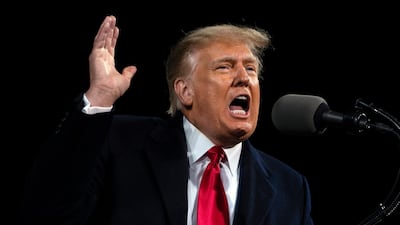Ten former US defence secretaries sounded a warning on Sunday about efforts to overturn the presidential election results.
In an opinion piece they co-authored for The Washington Post, they said any move to involve the military in pursuing claims of poll fraud would take the country into "dangerous, unlawful and unconstitutional territory".
The warning from former Pentagon chiefs in both Democratic and Republican administrations, two of whom served under Mr Trump, implicitly questioned the president’s willingness to follow his constitutional duty to relinquish power peacefully on January 20.
After the November 3 election and subsequent recounts in some states, as well as unsuccessful court challenges, the outcome is clear, they wrote, while not specifically mentioning Mr Trump in the article.
“The time for questioning the results has passed; the time for the formal counting of the electoral college votes, as prescribed in the constitution and statute, has arrived,” they wrote.
The article delivers an extraordinary rebuke to Mr Trump, who continues to make unsubstantiated claims that the presidential election in which he lost to Democratic candidate Joe Biden was rigged. It was published two days before Congress meets to certify the election result. Although usually a formality, some Republicans in the Senate and House of Representatives have said they will try to delay the certification pending further scrutiny of the poll.
Mr Trump has backed the move and is urging his supporters to rally in Washington on Wednesday to show their opposition to the election result.
The former Pentagon chiefs also warned against use of the military in any effort to change the outcome.
“Efforts to involve the US armed forces in resolving election disputes would take us into dangerous, unlawful and unconstitutional territory,” they wrote. “Civilian and military officials who direct or carry out such measures would be accountable, including potentially facing criminal penalties, for the grave consequences of their actions on our republic.”
Senior military officers, including General Mark Milley, chairman of the Joint Chiefs of Staff, have said publicly in recent weeks that the military has no role in determining the outcome of US elections and that their loyalty is to the Constitution, not to an individual leader or a political party.
The 10 former Pentagon leaders also spoke of the dangers of impeding a full and smooth switch at the Defence Department as part of the transfer to power. Mr Biden has complained of efforts by Trump-appointed Pentagon officials to obstruct the transition.
Without mentioning a specific example, the former defence secretaries wrote that transfers of power “often occur at times of international uncertainty about US national security policy and posture”.
“They can be a moment when the nation is vulnerable to actions by adversaries seeking to take advantage of the situation,” they wrote.
Tension with Iran represent such a moment. Sunday marked one year since the US killing of Qassem Suleimani, the Quds Force commander. Tehran has vowed to avenge the killing, and US officials said in recent days they are on heightened alert for potential Iranians attack on US forces or interests in the Middle East.
In a further sign of US-Iranian tension, the acting secretary of defence, Christopher Miller, said on Sunday evening that he had changed his mind about bringing the aircraft carrier USS Nimitz home from the Arabian Gulf and instead will keep the vessel on duty. Mr Miller's announcement last week that the ship would return had been opposed by senior military officers.
Mr Miller cited “recent threats issued by Iranian leaders against President Trump and other US government officials” for reversing his decision.
The opinion article in the Post was signed by Dick Cheney, William Perry, Donald Rumsfeld, William Cohen, Robert Gates, Leon Panetta, Chuck Hagel, Ash Carter, James Mattis and Mark Esper.
Mr Mattis was Trump’s first defence secretary; he resigned in 2018 and was succeeded by Mr Esper, who was fired days after the November 3 election.
The Post reported that the idea for writing the opinion piece began with a conversation between Mr Cheney and Eric Edelman, a retired ambassador and former senior Pentagon official, about how Mr Trump might seek to use the military in coming days.

